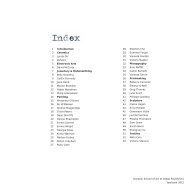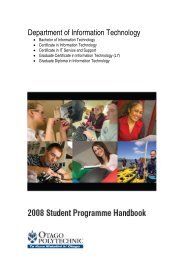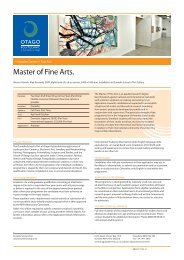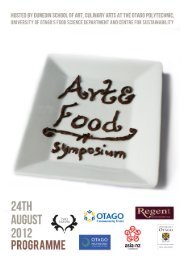Dunedin School of Art Postgrad Booklet.indd - Otago Polytechnic
Dunedin School of Art Postgrad Booklet.indd - Otago Polytechnic
Dunedin School of Art Postgrad Booklet.indd - Otago Polytechnic
Create successful ePaper yourself
Turn your PDF publications into a flip-book with our unique Google optimized e-Paper software.
Inspiration from the fringe<br />
A postgraduate student at the <strong>Dunedin</strong> <strong>School</strong> <strong>of</strong> <strong>Art</strong><br />
specialising in painting and drawing, Flynn Morris-Clarke<br />
is fascinated by the construction <strong>of</strong> human identity.<br />
Drawing from the imagery that inspires him, he is able<br />
to explore the public identity his subjects – most<br />
dwelling on the fringes <strong>of</strong> popular culture – have<br />
created for themselves.<br />
“I have always been interested in people who need to construct<br />
and re-construct their identity; as if their transformations are<br />
(at least for them) a necessary strategy through which they can<br />
release themselves from the ordinary so-called ‘truths’ forced<br />
upon them”, explains Flynn, a 2010 Wallace <strong>Art</strong> Award fi nalist.<br />
“I’m not necessarily interested in how the media constructs<br />
their identity – more how we could construct our own identities<br />
and where those infl uences come from. Muses are much more<br />
interesting when they’re risking it, I guess that’s what’s intriguing<br />
about (transgender movie star) Candy Darling.”<br />
Flynn’s work can be a very solitary pursuit and he readily<br />
acknowledges he’ll think for many days about a project and<br />
then execute it very quickly. His challenge has been to organise<br />
his thoughts into a cohesive enough concept to produce a<br />
consistent body <strong>of</strong> work. It is this challenge that his supervisors<br />
at the <strong>Dunedin</strong> <strong>School</strong> <strong>of</strong> <strong>Art</strong> have really helped him address<br />
through conversation and direction.<br />
“The ‘work’ is largely a result <strong>of</strong> conversations I have with my<br />
supervisors. I couldn’t ask for much more from (theory supervisor)<br />
Leoni Schmidt. She’s been so honest with my work – if she likes<br />
it she tells me, if she doesn’t she tells me. She takes my lexicon<br />
<strong>of</strong> ideas and attempts to refocus me in order to write something<br />
coherent, in what I could only describe as a straightforward way,<br />
at least in my mind.”<br />
“I also have a strong relationship with (studio supervisor) Neil<br />
Emmerson, who really seems to get me and the direction I want<br />
to take my project. His guidance is more casual – we’ll have<br />
c<strong>of</strong>fee, sit in front <strong>of</strong> work and discuss ideas.”<br />
“It’s allowed me to develop in a way that makes my work more<br />
coherent and interesting. This is so benefi cial in terms <strong>of</strong> practice<br />
– it’s given me more confi dence.”<br />
“It’s allowed me to develop<br />
in a way that makes my<br />
work more coherent and<br />
interesting.”<br />
<strong>Art</strong>work: Untitled, watercolour on paper, 35x28cm, 2011<br />
www.otagopolytechnic.ac.nz/art<br />
21 21








